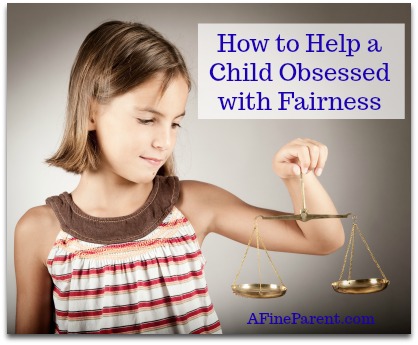 “It’s not fair!”
“It’s not fair!”
All day yesterday I listened to my 9 year-old son tell me that my decision to have him stay home and not play with his friends was completely unfair.
There were too many chores that needed doing, and, besides, he’d been at school all week and had barely interacted with his little sister in days. I wanted to give my daughter the quality time with her older brother she’d been craving since Monday.
“But, it’s not fair!” he cried then. “I didn’t get to play with them all week!”
“And it’s not fair to your sister,” I explained. “She hasn’t gotten to play with you all week. She loves you and wants to spend time with you. And she wants to feel like her big brother wants to spend time with her, too. So, do that for me today and you can see your friends tomorrow.”
He sucked up his frustration – albeit with some final grumbling – and feigned having fun playing with his sister. Soon enough, he didn’t need to pretend anymore. He was legitimately having a good time.
Yet, it was inevitable that he’d remind me today of the deal we’d struck yesterday. Just as it was inevitable that the unfairness baton would be passed to my daughter, who would turn her focus inward and complain about the wrong she perceived being done to her.
“Can I go play next door now?” my 9 year-old son asked as he placed his breakfast plate in the kitchen sink.
I cringed at the question.
It had to be the tenth time he’d made that request since the day before, and so I winced at the sheer repetition of it.
I paused because I was about to replace my many “no’s” with a single “yes.” I flinched because I knew that when I finally gave my son the okay he’d long been looking for, the tables would turn and my 4 year-old daughter would be the one hurling a slew of complaints my direction.
“Yes,” I told him. “But I want you to play outside. It’s too nice to be indoors.” There. Parental authority maintained. Message sent that I was not giving in on everything.
“Okay,” he called gleefully as he ran to get his shoes.
Right on cue, my daughter looked up from her half-finished plate.
“It’s not fair!” she cried. “Then, I’ll have nobody to play with!”
Ugh.
Yes, the fairness police have been known to rear their ugly heads in my home. And while my husband and I do try to instill a healthy level of justice in our family, we also make it a point not to allow an obsession with fair dealing rule the day.
We learned at an early stage in our parenting that something had to be done about our eldest’s concern with even handedness. As an only child for the first five years of his life, it was easy for us to absentmindedly give him his full share of nearly everything he wanted.
But, when we visited cousins and he suddenly had to share, it was immediately clear that something had to change.
And, so, we got started at an early age teaching our son – and years later, our daughter – that while we respect and understand their natural desire for fairness, the fact remains that life is typically unfair. As their parents, one of our most important jobs is to help them to recognize this fact and to respond to it in a healthy way.
What follows are some ways we have helped our children to distinguish between a serious and worthwhile grievance, and one they should just let roll off their back.
Show Your Child, More than you Tell, that “Life’s not Fair”
 Life is not fair. But how do we teach this basic and painful truth to our children?
Life is not fair. But how do we teach this basic and painful truth to our children?
We can always tell them “life isn’t fair,” but children need to learn this one for themselves.
One day my son complained that he was the only one in his grade without a cell phone. I responded with a reminder that there are a huge number of children in the world who don’t have their own bedroom, running water, or a refrigerator stocked with more food than they could possibly eat.
As our children grew, my husband and I found that this point could best be made by involving our kids in opportunities to help those who have less than they do.
We found ways that they could volunteer, even at their young ages. We pitched in at a local farm, picking fresh fruits and vegetables that would be sent to area soup kitchens. Another day, we joined hundreds of other do-gooders to pack lunches for the homeless.
In opening our children’s eyes to the world of unfairness outside themselves, the aim is to build within them an intrinsic awareness of the injustice that others suffer. To teach them that there are inequalities far more significant than who got the bigger slice of cake.
With repeated tangible experiences of the ways others lack more than us – and an opportunity to do something about it – a parent’s reminder that “life’s not fair” isn’t just some abstract concept. It becomes, instead, a learned fact that helps our children stop focusing on their trifles and understand that their role is to help lift the burden of unfairness off others.
Distinguish Between True Injustice and the Consequences of Personal Choice
To a child, everything has the potential to be seen as unfair – even choices they make for themselves.
My daughter once grumbled that it wasn’t fair that her brother got to eat watermelon with his dinner while she was stuck with strawberries. I had to remind her that she, in fact, was the one who’d asked for strawberries in the first place.
Life is full of opportunities to lament the raw deal it appears we’ve been given. Even as adults, we are not immune to this fact.
My husband and I have succumbed to the envy bug on occasion – coveting a friend’s lavish home, for instance. Before we sank into full-blown self-pitying jealousy, though, we forced ourselves to remember that this friend chose his highly lucrative profession – a career path my husband or I could have taken.
If it’s so easy for us adults to ignore the sacrifices others have made and instead focus on the rewards they’re getting, then imagine how much easier it is for a child to do the same.
As parents, it’s our responsibility to alert our kids to the fact that not everything is an injustice. We need to remind them that sometimes the benefits we see others enjoying are the very fairly earned results of their own choices.
Give Each of Your Children What They Need When They Need it
 One thing my parents taught be was that fair doesn’t always mean equal.
One thing my parents taught be was that fair doesn’t always mean equal.
“It all comes out in the wash,” my mother would tell us. Usually, the sentence was uttered when one of us complained that another sibling had gotten something we hadn’t.
In other words it would all pan out equally in the end. “I give each of you what you need when you need it,” she would reassure us.
Indeed, we saw it to be true. If one child was sick and got to lay on the couch binge-watching television all day, we could rest assured that in a week or so, we’d likely be ill with the same sickness, miserably reaping the same reward.
If one of us needed shoes for track, we knew that when we needed new shorts for volleyball we would get them. We didn’t need to get shoes or even a small consolation prize of a candy bar to make things feel fair.
As adults, we’ve seen our parents give away their gorgeous living room furniture to one sibling and then, years later, their patio furniture to another. The reasoning for the gift had nothing to do with favoritism and everything to do with who happened to need certain furniture at the same time my parents happened to be upgrading theirs.
Require Your Children to Have a Responsibility to Others
 Too often, when I ask my children to help clean up messes they haven’t made, they respond with a whiny, “But, I didn’t do that! It’s not fair!”
Too often, when I ask my children to help clean up messes they haven’t made, they respond with a whiny, “But, I didn’t do that! It’s not fair!”
Instead of rolling my eyes and begin a tirade of how ungrateful they are I gently remind them that most of the messes I clean up in the house are ones I did not make, but that I clean them up anyway because tidying up is a family responsibility.
Laundry is a fantastically tangible example of this. I can show them the laundry basket and they can see that I do all the laundry and, yet, only 20% of what is in there is mine.
When children are always getting but rarely giving, their focus, understandably, turns (or remains) inward. Everything is about them and what they’re getting. Nothing, it seems, is about what they’re doing for others.
Head off your child’s obsession with how she’s treated or what she’s missing out on by requiring her often to focus her attention on how she can help others – even if it’s just the other members of her family.
Require your children to pitch in and help around the house with cleaning up after not only themselves, but also their family members. Family means to help each other out – especially when we’re gaining no rewards from doing so.
Give Children Freedom and Autonomy
We parents today are so often tempted to sniff out wrongdoing against our children and swoop in to save them before they’re emotionally damaged.
I get it – when we hear our kids escalating towards an argument, or when they directly request our involvement in their fracas, it’s easy to jump in and take over. It feels like it will end more quickly – or, we pray, peacefully – that way.
But, I’ve seen firsthand that when we help guide them (if they’re younger) or leave them (if they’re older) to solve the problem between them, children can, indeed, come up with better solutions than we adults might have imagined.
But hovering over our kids too often and balancing inequities for them leaves us with a larger problem to fix: adult children who only know how to complain about their problems as opposed to doing something about them.
In a study on the reasons and effects of over-parenting, Judith Y. Locke, Marilyn A. Campbell, and David Kavanagh, of Queensland University of Technology in Australia, found that over-parenting can result in “poor resilience, a sense of entitlement, high anxiety levels, poor life skills, and an inadequate sense of responsibility.”
Thus, many times, when my children gripe about unfairness, I leave them to find a way to compromise before I intervene.
Though this tactic admittedly began as a frustrated surrender (I was honestly just throwing in the towel at that moment), I quickly saw its many benefits – mainly, that my kids actually became kinder to one another. After all, to get what they want, they first need to be sensitive to their sibling’s desires.
At the very least, when they take responsibility for their own solutions, they learn valuable lessons about problem solving, considering others’ feelings, and standing up for themselves. And they’re very likely to peacefully accept the terms of the agreement since they came up with them.
Find a Middle Ground
In the end, we should remember that while our kids need to learn that life often seems unfair, they also need to learn that respect for each other and some degree of equality are notions we should still strive for.
The key lies in knowing when to let a gripe go and when it’s time to fight for justice.
Life is – or, it should be – less competition and more cooperation.
If we model this in our home by respecting and instilling a healthy level of fairness while also teaching that we need not always keep score, then our kids have a much better chance of becoming adults who are good at giving and not too concerned with getting – the kind of adults we all should be.
2-Minute Action Plan for Fine Parents
Quick tips for teaching kids today to be a little less obsessed with fairness:
- Is there a place that you and your children can volunteer this week? Or can you pick through some toys and clothes and take them to a homeless shelter?
- What is one area where they can pitch in around the house? Laundry? Dishes? Putting toys away from the main living space?
- Talk through their feelings. When they feel unfairly treated, help them to discern why and whether their feelings are true to the situation at hand.
- If their concerns about unfairness are valid and poignant, help steer them in the best direction to address and fix the unfairness.
Long-Term Action Plan for Fine Parents
Assess to what degree you model what you want to see in your children. To what degree do you complain – especially in front of them – about the unfairness of things? Do your complaints tend to center on you or your family, or on those outside your home who are less fortunate than you?
Try journaling or keeping a running tally of your complaints so that you have an honest look at just how often – or how little – you obsess over inequality. Include the topic of complaint in your tally so you can see whether your frustrations tend to be justified or unmerited.
The more you model concern for others over concern for self, the better chance you have of seeing your children begin to behave in like manner.
Although I am not a parent (by choice), I have been helping a friend, who is a widowed single mother of 5 children (ages 13, 11, 10, 8 and 3 oldest and youngest are girls), to care for her children and keep her house in order. I have been listening to the 3 boys cry and bemoan the phrase “it’s not fair” to the point I want to poke out my eardrums! Especially the youngest boy. I have tried my father’s tactic of telling them that “nothing in life is fair” but it seems to fall on deaf ears (lucky them!) Out of desperation and my deep desire to still be able to hear the calm, soothing and comforting songs my favorite bands (Five Finger Death Punch, Disturbed, Halestorm, Shinedown, etc.) played at the loudest possible level on my bluetooth speaker (if my hearing is to be damaged, it will be done listening to something I love – not the sound of whining children), I googled how to make a child understand fairness. I read a few other articles, but when I read yours, I was truly humbled! You did a great job in breaking down the real issue! Furthermore, you suggestions on how to correct the issue (and save my hearing for my favorite metal/hard rock bands to destroy) were not only considerable in number, they where also comprehensive in scope and put forth in a manner that was easy to comprehend. I am honest and truly impressed by what you wrote, something that rarely ever happens (I have a B.S. in history and J.D. and had my own private legal practice for 16 years, so I have read a lot of educational material and yours is outstanding!). Thank you for taking the time to write it! I was so impressed I even signed up for the free parenting class (it can’t hurt). I will send you an email to let you know how things are going in the “it’s not fair” world after I try some of the techniques and implement some of the ideas . I am especially fond of the idea of donating time to an organization to help those in impoverished environments, and this one is at the top of my list! Thank you again!
Sincerely,
Christina Heikkinen (grateful non-parent)
Your articles are so well written and helpful! Thank you. I would love to have you on my live vodcast (video via zoom and social media) The Happy Huddle. I love teaching positive psychology tools and conscious parenting. More people need to know about you and these great articles! For more about me see Happierbytheminute.com. Have an awesome day :0)
Thanks for sharing!
You’re welcome, Camelia! I hope you enjoyed it and found it helpful!
Thank you for this well written article, Michaelyn. I’m sure all parents can relate. The action plans are very apt too. My most important take away is – model exactly what you want to see in your kids.
Thank you, Love A., for your comment. Yes, kids are sponges, and I suppose in everything we must model what we want to see in them! I’m glad you enjoyed the article.
Well written article. Good practical tips.
Thank you, JMW. I’m very glad you found it helpful!